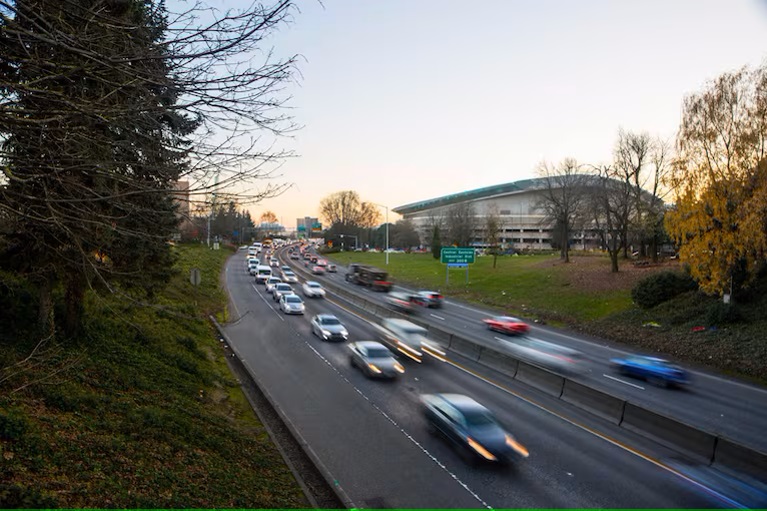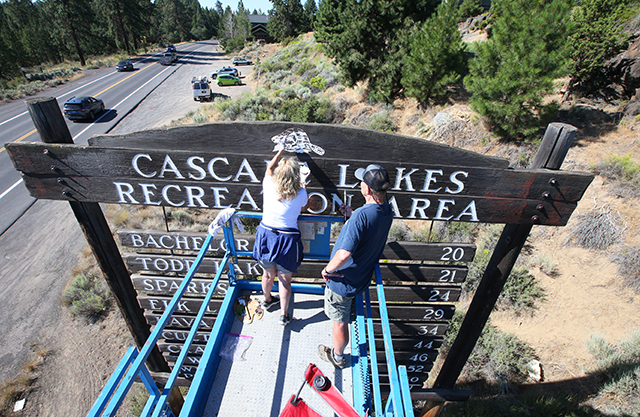Transportation leaders caution Oregon officials on impending layoffs, highway funding loss
Published 6:36 pm Thursday, July 24, 2025

- Interstate 5 runs through the Rose Quarter in 2017.(Submitted by Bradley W. Parks)
Transportation Commission aproves initial phase of the I-5 Rose Quarter Improvement Project despite concerns
Leaders of Oregon’s Department of Transportation issued their most dire warning to date Thursday about cuts to services, including road maintenance and snow plowing, if legislators don’t patch a $350 million hole in their budget.
The five-member Oregon Transportation Commission on Thursday heard testimony from leaders across various sectors of the department, which was saddled with hundreds of layoffs after lawmakers failed to pass a watered-down transportation package that would’ve covered a more than $350 million shortfall the shrinking agency has been facing.
The commission heard details about the pain those cuts could inflict on workers and everyday Oregonians from the agency’s various leaders as well as Kris Strickler, the department’s director, and an adviser of Gov. Tina Kotek.
Trending
The body also unanimously voted to move forward with an initial phase of a sprawling Portland-area reconstruction project on Interstate 5, despite a more than $400 million cut in federal funding under the Trump administration. Members and supporters said delaying the project could raise the cost of future contracts and erode trust in the state government.
“This is really a somber moment for the commission,” Julie Brown, chair of the transportation commission, told attendees on Thursday. “We’re really struggling, so we’re asking for grace here as we try to maneuver through this day.”
Kotek on Tuesday said that she would call lawmakers back in a special session to try to address the department’s budget shortfall. Her proposed fix increases Oregon’s 40-cent gas tax to 46 cents and doubles the current state payroll tax from 0.1% to 0.2%, among other fee increases for electric vehicle use and registration.
But it doesn’t include any additional money for larger capital projects that were originally included in previous iterations of lawmakers’ transportation package, which would have cost taxpayers more than $10 billion. Those more expansive bills ran into objections from Republicans and some Democrats, and legislators ended up leaving Salem without any action on the department’s budget shortfall.
“Sort of a Band-Aid approach is what we’re calling it. It is not a transportation package,” Kelly Brooks, Kotek’s transportation and infrastructure adviser, said Thursday. “It is a near-term transportation budget fix, the entire goal of which is to cover the budget that was passed by the Legislature.”
Commissioners also received breakdowns of the 483 workers who received layoff notices from the transportation department, alongside the 449 vacant positions the department is cutting. Kotek since has extended a pause on those job losses until Sept. 15 for lawmakers to act. The commission heard from department leaders who warned that more layoffs and cuts would be necessary in 2026 if no action is taken by the Legislature in August.
Trending
The process of laying off hundreds of workers could take weeks or months given union policies protecting more senior workers, though cuts have already spread across various sectors such as worker safety, back-room logistics, public transportation, the Department of Motor Vehicles and financial and policy analysts.
In the meantime, agency leaders told commissioners that the lack of positions and funding could lead to more graffiti, delays in snow plowing and road openings, fewer maintenance facilities, and slower pothole repairs.
“All of us, the agency, Legislature, governor, it’s time to, I think, lay down some of the historic battleground and really think about where we can go to find reasonable solutions,” Commissioner Jeff Baker said Thursday. “Because there’s a solution out there.”
Rose Quarter to move forward with assessments, initial repairs
Commissioners did not take any action on the issue of the transportation department, but they did vote unanimously in their meeting to move forward with what they call “Phase 1A” of a sprawling Portland highway project known as the I-5 Rose Quarter Improvement Project.
The project lost an estimated $450 million in funding from the federal government earlier this month after Congress’ passage of the Republicans’ tax and spending bill, a possibility first reported by the Oregon Journalism Project earlier this month. That prompted Strickler to ask the commission for feedback on whether to pause the project entirely or move forward with an initial section of work and engineering assessments with funding that is still available.
Many who came to testify in person at Thursday’s meeting were in support of moving forward with the project and its goal to put a freeway deck or cap over a portion of Interstate 5 to relink Portland’s Black Lower Albina neighborhood, split by freeway projects decades ago. A few public commenters opposed moving forward with the project until the department received further funding or clarity from lawmakers.
“I did not come here today to litigate with white environmentalists who have absolutely no connection to our people, our pain, or our collective struggle for progress,” said JT Flowers, director of government affairs and communications at Albina Vision Trust, which advocates for the project on the grounds that it will help to rectify historical racial injustices.
Department officials estimate the whole highway expansion project to cost more than $2 billion, with their initial phase requiring about $75 million. The project was born out of a 2017 transportation package in which lawmakers passed an eight-year tax.
Funding from that bill has remained intact, and transportation leaders urged the board to move quickly with the initial phase to avert the loss of competitive contracts and deterioration of bridges while meeting legal requirements for storm collection.
“There’s a cost to trust, and this is a cost that we’re passing on to every future project,” said Commissioner Alicia Chapman, who was promptly met with loud applause from the audience. “So if we renege on phase 1A, how much does that really cost us? I don’t think we can even calculate that.”
Kotek has expressed support for the highway expansion project. She told reporters Wednesday that she believes the federal government had made commitments to fund at least “one portion of the project.”
“We have to develop a path to get that project. I do think it’s critical. It’s a safety issue,” she said. “I think it’s a modernization issue, and at this point, we don’t have a clear path to funding it, but we’re going to continue to work.”
Commissioners also agreed to revisit modifications to the agency’s leadership structure proposed by Strickler, whose department is currently missing two top leaders: for director of delivery and operations and director of external affairs.








